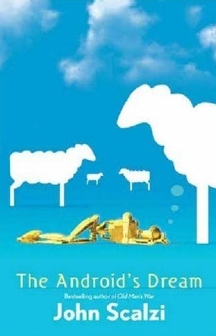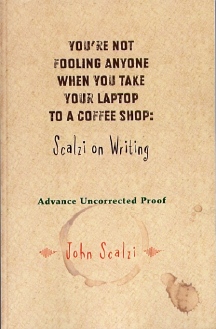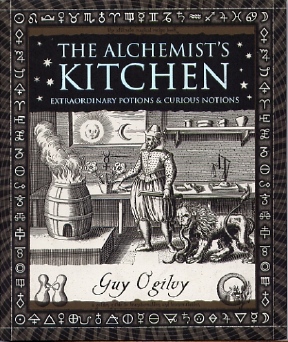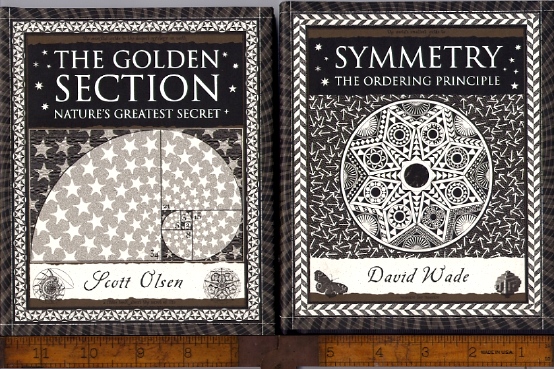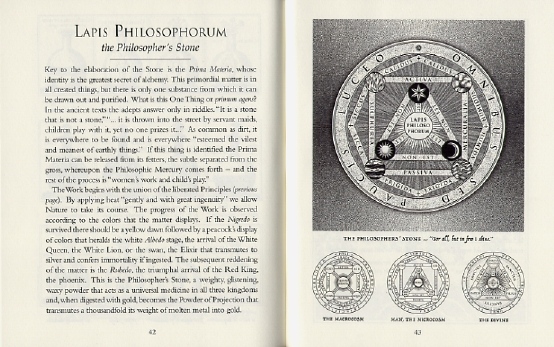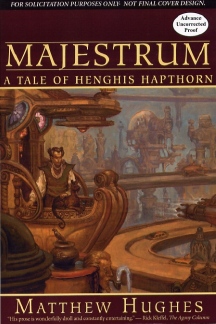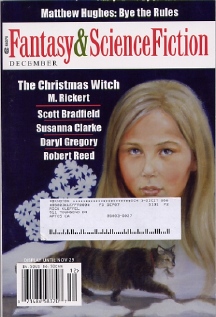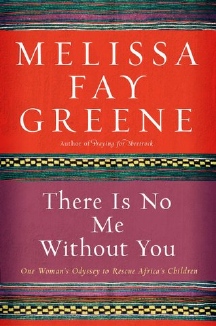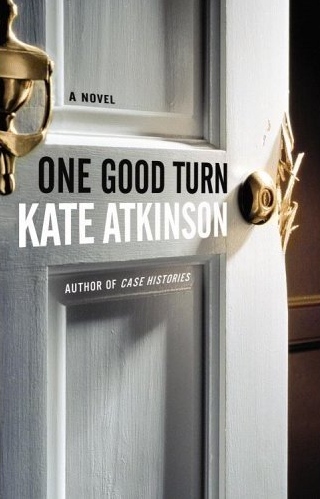|
|
|
This Just In...News from the Agony Column
|
11-10-06: 'You're Not Fooling Anyone When You Take Your Laptop to a Coffee Shop' |
||||||
Scalzi
on Writing
John Scalzi is that man, 'You're Not Fooling Anyone When You Take Your Laptop to a Coffee Shop: Scalzi on Writing' (Subterranean Press ; February 2007 ; $35) is the book, and if you are interested in trying to turn your writing into something more than a hobby, or just find writing itself an interesting subject (and what ardent reader wouldn't?), then you might just find this book well Worth Your Valuable Time. Scalzi leads the life of Riley, to a certain large extent. He's the blogger made SF-writer made good. If you're looking for a great time reading the kind of science fiction that made you love SF when you were a kid and want to love it again, in the same way, now that you’re an adult, then you can simply read 'Old Man's War', 'The Ghost Brigades' or 'The Android's Dream' (Tom Doherty Associates / Tor Books ; November 10, 2006 ; $24.95). Scalzi makes writing SF look ridiculously easy because it is in fact ridiculously hard. His new novel is a standalone work about Harry Creek, a diplomat with a problem involving aliens and sheep (not not that problem). Scalzi should be on your auto-buy list. He's a big enough deal that you should be able to find the book in just about any bookstore, unless you trip over it because you’re clutching your laptop on the way back from the coffee shop.
Scalzi's advice on writing is filled with the same humor and intelligence that makes his fiction so entertaining. And it's not just about writing fiction, but about all the kinds of writing you might end up doing. Frankly, the chances are far greater that you'll need to be good at writing corporate claptrap than they are that you'll need to be able to write science fiction. Scalzi makes the whole thing entertaining to the reader, and instructive to the potential writer without being crushingly depressing or annoyingly cheerful. This is, alas, real life for me as well. I'm up at 4:01 AM, and I've not got a great deal of time to go on about Scalzi today. You know him. Here are two new books by the guy; read 'em and weep. Alas, I've got some corporate claptrap to write. And you know what? I'll make more from that brief interlude than I have from five years, yes FIVE YEARS writing for my website. Scalzi has some advice for me, I suspect. Perhaps I should listen. |
|
11-09-06: Kitchens, Sections and Symmetry from Wooden Books |
|||||||
Delivering
Precision
In spite of a title like 'Symmetry' or even 'The Golden Section', these books are neither for nor by Rocket Scientists; this is not to say that your average Rocket Scientist wouldn't enjoy them, but rather that the books take rather abstruse subjects and deal with them in a way that anyone could enjoy. A brief bit of excellent prose. A mind-bogglingly gorgeous presentation. A "Damn, I wish I had the poster" illustration. It's a formula all right, but not a bad formula. In fact, I'd say that this is fairly foolproof so long as Walker & Co. keep the quality high, which in these three titles, they certainly manage. So...
'Symmetry' is certainly a fixation of mine, being that I' sort of a clean freak. At least that's what the kids say. That said, Wade offers a pretty decent and mathematical look at the reasons you must make the bed every morning and pull up the sheets just so. You see, if you don’t, the world ends. That's all there is to it. David Wade gives a perfect example of why these books are so utterly cool and compelling in 'Symmetry'. It's the level of detail supplied. On one hand, these are books where you can pick them up and read a single, small page faced with an illustration to die for. On the other hand, Wade does supply enough hard-math detail to make the book seem pithy as opposed to frothy. I can't imagine anyone who would not like to receive this book, unless they were remarkably asymmetrical. 'The Golden Section' by Scott Olsen is a bit more obscure, at least if you're not a fan of ex-Ultravox vocalist John Foxx, who once released an album (which I own) of that same title. Here again, in precisely 58 pages, Olsen will supply to you a picture perfect (and just a little bit precious) definition of a mathematical and historical curiosity. He'll also toss in just as many pages of gorgeous illustrations as he does prose, even if some of the illustrations are prose, or at least, text rendered as a pitcher. I'd target this little book towards the artist in the family, or the decorator, since the whole concept of the Golden Section is sort of the Greek take on feng-shui.
All told, Walker & Co and Wooden Books are keeping up the quality as well as the quantity, and believe me both are important. Variety is important in this line of publishing and Wooden Books manages to find a pretty fascinating variety within a peculiar but well-defined oeuvre. At ten bucks a pop, these books are pretty sweet. Look at it this way. Say, five years from now what are you going to be more likely to be page through – a weathered and beat-to-shit paperback copy of some turgid thriller bestseller or one of these totally cute little hardcover illustrated books? I think you're going to be least embarrassed to page through one of these Wooden Books. Now you won’t find these shelved in the bookstore. They’re going to be on a little stand up by the cash register, waiting for you to drop thirty bucks on an impulse gift buy. Take my advice, should you decide to buy them as gifts, buy two copies, one for the lucky recipient and one that you can tell yourself is for some other person but is really going to be for you. Otherwise, all those years down the line, you're likely to find that the main thought that might be running through the shattered remains of your tiny brain is, "Now, who was I going to give that damn book?" |
|
11-08-06: Matthew Hughes' 'Majestrum' |
||||||
The
More Things Change
Hughes is remarkably busy these days, with new work popping up all over the place. He leads off the latest issue of F&SF, with a new Guth Bandar story titled 'Bye the Rules'. But for those who crave a meatier fix, you could ask for nothing better than 'Majestrum' (Night Shade Books ; January 20, 2007 ; $24.95). Hughes is an interesting writer who uses the tropes of science fantasy to explore concepts usually treated in other genres. What makes his work totally outstanding is that he turns those explorations right around dives back into science fantasy with a fierce determination to get weird. The backdrop here is Hughes' Old Earth universe, a wholly original and satisfying homage to Jack Vance's 'Dying Earth' series. If you don’t know the drill, the gist of the matter is that humanity has spread out across the stars and populated worlds. Science is so old and so advanced that it's starting to look like magic. But what's worse is that the universe is changing. The laws of physics are slowly mutating into something called sympathetic association. Ask for all the sympathy you like, it still boils down to magic. And broken tech. Henghis Hapthorn is a Holmesian kind of guy in Hughes' universe. He knows his mind is the best tool out there for solving problems. Unfortunately this swing towards the sympathetic has affected his mind, split it in two. The old half is there, solving away like a good calculator. But there's a new half that seems attuned to all the sympathetic strangeness and finds itself obsessed with certain book that may unlock some secrets about the change that is sweeping the worlds of the Spray. In a bit of a mess, Hapthorn finds himself hired to check out a Lord's daughter's beau. It should come as no surprise to readers that the disparate mysteries are tied together and that the solution leads to the heart of the empire and an ancient power.
For me, it's the combination of his sense of humor and his sense of the surreal that makes Hughes so accessible. Hughes loves his characters, his settings and crafts a nice little mystery in every novel. He makes what he does look remarkably easy. Better still, he makes it easy for anyone who enjoys reading. You don't have to care about universes and magic or any of the genre claptrap. Just read the words. Hughes won't let you down. Reality, however, is another matter. Hughes might just let reality down; and reality itself might not treat you nearly so well as Hughes. |
|
11-07-06: An Interview With Melissa Fay Greene |
||||||
"Why
don't you write FICTION???"
RK: How did you find out about and then eventually find the heroine of your book, Haregewoin Teferra? MFG: I wanted to write about some of Africa's AIDS orphans WITHOUT placing a great white aid-giver in the foreground. I heard of Mrs. Haregewoin through the network of adoption workers in Addis Ababa; I heard she was using an empty truck-trailer to help house children and that she was keeping files on each child. When I met her and saw right away that she was middle-class, educated, bilingual, I was appreciative of how she went against the West's stereotypes and cliches of African women (barefoot, squatting, illiterate...). I had NO IDEA at that time what a rocky life she'd had, and would have. RK: Since you -- and your family became involved in this, and a part of your own story, how did this change the way in which you wrote the book?
But I unwittingly affected and turned the story. My profile of Mrs. Haregewoin for GOOD HOUSEKEEPING resulted in tens of thousands of dollars in charity being sent to her; the gifts from GH readers enabled her to move out of her one poor house on the muddy compound (the setting for most of the book) into two fine houses, with a big used van, more staff, rental property.... As bitterness and accusations rose against her, I saw they were in part a response to her windfall, of which I had been the cause. I hadn't meant to be part of this story; but I also didn't find it to be the sort of story you can write about and leave behind; so it became most honest to put myself in the scenes, as quietly as possible. RK: How might that change the way we as readers approach the book and leave it, should we wish to become involved in this story? MFG: Against all common sense, I was crushed when Mrs. Haregewoin turned out NOT to be saintly. As controversy heated up around her, I was stunned, feeling I didn't know her at all. I turned cold towards her. We reconciled when she opened up to me the whole story, in all its gory details. My discovery that Mrs. Haregewoin was flawed, was NOT a saint, didn't obscure the fact that she has saved hundreds of children. I personally feel informed by that, and hope readers would, too. We can't all be Mothers Teresa, but we can still be involved, save lives. Heck, even MADONNA found a small life to save. RK: How did the actions of your heroine affect the actual creation of the book? MFG: When she phoned me, mid-December 2005, from PRISON, everything came to a halt. First I made sure all her children were secure and had food and medicine. Then I stormed around shouting, "I WROTE this book already!" because my first book, PRAYING FOR SHEETROCK, ends with the protagonist in prison. And I had to call my publisher, as the book was due two weeks hence, to say, "Well, yes, the book is going well, but things have taken a weird turn in Ethiopia." In the long run, once Haregewoin was released and took me into her confidence again, we grew closer and the book grew stronger as a result. But it was a rocky time, with many sleepless nights during which I asked myself, "Why don't you write FICTION???" RK: How do you infuse the joy of life, the joy of the details of life in your work to create a novel-like feel? MFG: I try to write about the world as I experience it, which is to say there's never a circumstance when I fail to notice the quality of light, the ambiance, the flora, the moods and seeming intentions of the people; or when I fail to consider the background, the history, the economy, the psychologies at work. So I throw it all in rather impressionistically, while paying close attention to language. |
|
11-06-06: Jenn Ramage Interviews Kate Atkinson |
|||
'One Good Turn'
In this interview from her most recent stop in Capitola to the Capitola Book Café, Atkinson speaks with Jenn Ramage about her new novel 'One Good Turn'. It features the return of Detective Jackson Brodie, who gets to cool his heels in Edinburgh while his girlfriend performs in the Fringe Festival there. Brodie witnesses an automobile accident that escalates into a crime and finds himself immersed in another series of secrets. Atkinson is a master of showing us a vision of ourselves as Russian nesting dolls, each personality we display hiding another within. You can enjoy this latest podcast as an MP3 file, a RealAudio file or subscribe to the podcast. Settle back, put on your headphones or turn up the car stereo just loud enough to blot out the traffic, apocalyptic or otherwise, and pay attention to the road. (Advice that I'd do well to follow myself.) Jenn Ramage and Kate Atkinson will make sure that you're involved enough in their conversation that you'll not notice any bits of mayhem happening on the side of the road. Life is complicated enough. |
